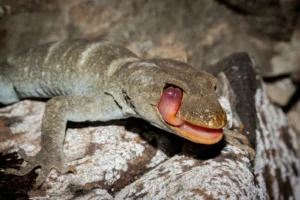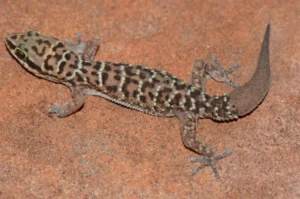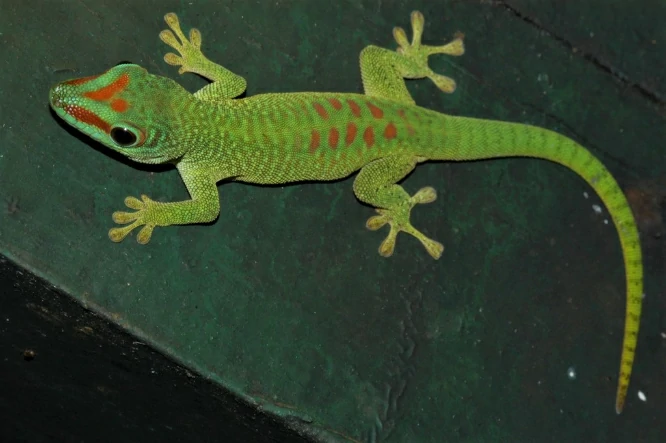It’s late evening, and your room feels chilly. You look over at your gecko’s tank and see it huddled in one corner, barely moving. Its usual curiosity is gone, and it looks stiff. You might start to wonder, can geckos actually die from the cold?
Yes, geckos can die from the cold if their body temperature drops too low for too long. Geckos are cold-blooded, which means they rely on heat from their surroundings to keep their body working. If the tank or room gets too cold and stays that way, their body slows down, they stop eating, can’t move properly, and if it keeps going, they could die.
Cold just isn’t something geckos handle well. In the wild, they find warmth on sunny rocks or in cozy hiding spots.
But in captivity, they rely on you for heat. Without it, things can go downhill pretty fast.
Why Geckos Need Warmth to Stay Alive
Geckos don’t make their own heat like we do. Their body temperature comes from the environment. If their tank gets cold, their body gets cold too.

When that happens, everything slows down; digestion, breathing, heart rate, even movement. They just don’t have the energy to do much. It’s not sleeping, it’s more like their body is struggling to keep going.
In the wild, geckos live in warm places where nights might get a little cool, but not dangerous. Pet geckos don’t have that balance.
If their tank suddenly drops below a safe temperature, they can’t warm themselves up, and that’s when it gets risky.
What Happens When a Gecko Gets Too Cold?
If a gecko gets cold, the first thing you’ll notice is it moves less. It might stop eating, hide a lot, or just sit in one spot.
At first, it might look like normal resting, but it’s actually a warning. Their body isn’t digesting food properly, and without warmth, food can rot in their stomach, causing bloating and sickness.
If it stays cold, things get worse:
-
Muscles get stiff, so they can’t climb or move normally
-
They lose coordination and may seem frozen
-
Breathing slows, and they become unresponsive
-
In extreme cold, their organs can start to fail, and that’s when death can happen
This doesn’t happen instantly. It’s slow and silent, and it gets worse the longer they stay cold.
How Cold Is Too Cold for Geckos?
It depends on the type of gecko. Not all geckos come from the same climate, so their temperature needs are a bit different.
Here’s a quick look at safe ranges for some common pet geckos:
| Gecko Species | Ideal Temperature Range (°F) | Danger Zone (°F) |
|---|---|---|
| Leopard Gecko | 88–92 (warm side), 75 (cool side) | Below 70°F |
| Crested Gecko | 72–78 | Below 60°F |
| Tokay Gecko | 80–90 | Below 70°F |
| House Gecko | 77–86 | Below 68°F |
| Gargoyle Gecko | 72–78 | Below 60°F |
For most geckos, anything below 65°F (18°C) is risky if it lasts long. A short drop might not hurt them, but if it stays cold overnight or for several days, they can get sick or die.
What Cold Does to a Gecko’s Body
When geckos get too cold, their metabolism slows almost to a stop. Their immune system gets weak, so bacteria and parasites that wouldn’t normally bother them can cause infections.

If your gecko already has low body fat or hasn’t eaten much, cold is even more dangerous. They don’t have energy reserves to handle stress.
Think of it like this: a gecko’s body runs on heat like a car runs on gas. Without it, nothing works. Even their organs need warmth to function.
Can Geckos Go Into “Hibernation”?
Some people think their gecko is hibernating when it gets cold, but that’s not really true for most species.
Geckos don’t hibernate like mammals. Some wild geckos can go through a short slowdown called brumation to survive cooler seasons, but that only happens in very controlled natural conditions; not freezing, and never for too long.
Pet geckos, especially leopard or crested geckos, aren’t built for this. In captivity, what looks like brumation often turns into accidental hypothermia, which can be deadly.
What To Do If Your Gecko Gets Too Cold
If you find your gecko cold and sluggish, don’t panic, but act fast and carefully.
-
Warm them slowly. Move them to a warmer room or gently raise the tank temperature. Don’t rush it, sudden heat can shock them.
-
Check their heat setup. Make sure heat mats or lamps are working. If one failed overnight, that’s probably why your gecko got cold.
-
Avoid direct heat. Never put them right next to a heater or bright light suddenly. Rapid heating can burn or stress them.
-
Hydrate them. Offer clean, lukewarm water in a shallow dish. Cold geckos often get dehydrated because their body stops processing fluids.
-
Watch for signs of recovery. As they warm up, they’ll start moving more. If they stay limp, don’t eat, or seem off after a few hours, call a reptile vet.
Keeping Your Gecko Warm at Night
One of the biggest mistakes people make is letting the tank get too cold at night. In the wild, geckos can find warm hiding spots, but in captivity, they’re stuck with what you provide.
Here’s how to keep things cozy:
-
Use a heat mat or under-tank heater. This keeps their belly warm even when lights are off.
-
Get a thermostat. It controls the temperature automatically so it doesn’t get too hot or too cold.
-
Provide hides on both sides. Your gecko can choose the warm or cool side depending on how it feels.
-
Use a digital thermometer. Stick-on dials are often wrong.
-
If your house gets really cold, a ceramic heat emitter that works without light can keep things warm at night.
How Long Can Geckos Survive the Cold?
If temperatures drop a little (into the low 60s °F) most geckos can survive for a few hours or maybe a night, though they’ll be sluggish.

If it stays that cold for 24 hours or more, it gets serious. Once their body temperature drops too much, organs start shutting down.
Some species, like crested geckos or gargoyles, can handle slightly cooler temps for a short time because they come from regions with mild nights.
Desert geckos like leopards aren’t as tolerant because they come from warm, dry areas where it rarely drops below 70°F.
A short cold spell might not kill your gecko right away, but leaving it cold for days definitely can.
Signs Your Gecko Is Too Cold
It’s actually easy to tell when a gecko is cold. Their body language says it all:
-
Moving slowly or not at all
-
Staying on the cool side of the tank all the time
-
Not eating or digesting food properly
-
Staying flat and low to the ground
-
Shallow breathing or stiffness
If your gecko’s belly feels cold to the touch, that’s a big sign it’s not warm enough.
What If the Power Goes Out?
Cold weather and power outages are a bad mix for geckos.
If you lose heat for a few hours, here’s what you can do:
-
Wrap the tank in a thick blanket or towel to hold in warmth
-
Use hand warmers or heat packs (outside the tank, never touching the glass)
-
Move the tank to a smaller, warmer room; like a bathroom with a closed door
-
If it’s freezing, you can even put your gecko (in a ventilated container) close to your own body heat to keep it from dropping too far
These tricks can buy you time until the power comes back.
What Happens After a Cold Shock
Even if your gecko survives, there can be lasting effects. Cold stress can weaken the immune system, cause respiratory infections, or make them stop eating for days.
If your gecko seems weak, sneezing, or breathing with its mouth open after a cold spell, it might have a respiratory infection.
This is one of the most common problems after being cold. A reptile vet can help, but preventing it is much easier than fixing it.
Conclusion
Geckos can definitely die from the cold. Being cold-blooded, they rely on their environment for every bit of warmth their body needs to stay alive.
If their temperature drops too long, their metabolism slows, they stop eating, and eventually, organs can fail.
The good news is, it’s easy to prevent. Keep the tank warm and steady with a heat source and thermostat, and check it often; especially in winter or during power outages.
Geckos may look tough with their sticky feet and calm faces, but when it comes to cold, they’re really delicate. A little extra warmth can make all the difference between life and death.
Hi, my name is Ezra Mushala, i have been interested animals all my life. I am the main author and editor here at snakeinformer.com.

